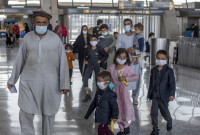Support strong Canadian climate journalism for 2025
The United Nations is predicting dire hunger for more than half of Afghanistan's people in the coming months unless Canada and its Western allies step up with greater financial support.
Monday's joint report of the UN Food and Agriculture Organization and the World Food Program says 22.8 million Afghans face acute hunger in the coming months, the highest level of need seen in a decade.The WFP says it will need as much as $272 million per month to cover a funding shortfall so it can deliver food aid.
The UN appeal for more funds comes as financial resources appear to be drying up to keep safe houses open in Kabul to protect and feed some 1,700 Afghans who have approval to come to Canada but remain trapped in the Taliban-controlled country.
Many of those Afghans and their families face reprisals from the Taliban for helping Canada, the United States and their NATO allies by working as interpreters.
The federal government has pledged to resettle 40,000 Afghan refugees, including those from vulnerable groups who have already left the country. A WFP spokeswoman in Canada says those who remain in the country cannot be forgotten.
"Afghanistan is fast becoming the world’s largest humanitarian crisis," said spokeswoman Julie Marshall.
"Before families are forced to choose between migration and starvation, WFP needs fast, flexible funding to continue our life-saving response in Afghanistan. Canada has always responded generously to WFP, but now more than ever we need all international donors to turn their pledges into funds immediately."
Afghanistan's economy collapsed along with its Western-backed government when the Taliban routed cities and rural villages before marching unimpeded into the capital of Kabul in mid-August.
The rolling Taliban offensive forced Afghans to flee the countryside in droves and seek sanctuary in cities, which created massive food insecurity not usually seen in urban areas of the country.
Marshall said the WFP has provided food, cash, and nutrition assistance to 10.3 million people since the start of this year. That has included malnutrition treatment for nearly 400,000 pregnant and breastfeeding women, and for 790,000 children under the age of five.
Last month, the UN launched a flash appeal for money to support humanitarian and development assistance and raised pledges totalling almost $750 million, but so far only 45 per cent of that amount has been delivered.
"Hunger is rising, and children are dying. We can't feed people on promises — funding commitments must turn into hard cash, and the international community must come together to address this crisis, which is fast spinning out of control," said David Beasley, the WFP's executive director.
Monday's report showed a 37 per cent increase in Afghans facing acute hunger since the UN's last detailed assessment conducted in April. It says 3.2 million children under age five will suffer from acute malnutrition by the end of the year, while one million kids are at risk of dying with immediate life-saving treatment.
Save the Children said Monday the new UN data shows that of the 22.8 million Afghans deemed to be at risk, 14 million of them are children. The organization noted that Canada pledged an additional $50 million in humanitarian aid in late August but said Monday that more "life-saving support" is desperately needed.
A spokesman for International Development Minister Karina Gould said Monday that Canada's $50-million contribution was in addition to $27.3 million allocated to Afghanistan earlier in the year, but he would not say whether any more funding would be forthcoming.
"It seems there is no end to the agony for Afghan children. After decades of war and suffering, they now face the worst hunger crisis in their country's history," said Chris Nyamandi, Save the Children's country director for Afghanistan.
"The situation is already desperate. We see young children in our clinics every day who are wasted from severe malnutrition because they have nothing but scraps of bread to eat," he added.
"We will continue doing everything we can to get them the life-saving services they need, but for aid efforts to continue we urgently need governments to step up with more aid to the country."
This report by The Canadian Press was first published Oct. 25, 2021.





Comments